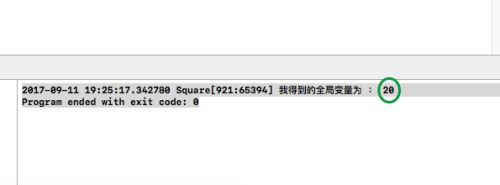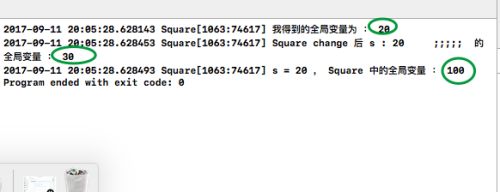(来源:https://www.runoob.com/cplusplus/cpp-namespaces.html)#includeusingnamespacestd;namespaceA{inta=100;namespaceB//嵌套一个命名空间B{inta=20;}}inta=200;//定义一个全局变量intmain(intargc,char*argv[]){cout<<"A::a="<
PHP 超级全局变量
lly202406
开发语言
PHP超级全局变量引言在PHP编程中,超级全局变量(Superglobals)是一类特殊的变量,它们在任何函数、类或文件中都可以访问。这些变量在PHP的全局作用域中始终可用,为开发者提供了处理HTTP请求和响应的强大工具。本文将详细介绍PHP中的超级全局变量,包括其作用、使用场景以及注意事项。超级全局变量列表PHP中常见的超级全局变量包括:$$_GET:获取通过URL传递的GET参数。$$_POS
html中用npm包
是谁眉眼
htmlnpm前端
一.用webpack工具打包npm包到dist下js文件为浏览器能识别的文件1.创建一个文件夹html中引用打包后的js文件注意打包后的js文件是局部变量如果要在html中引入js中的变量先去js中把变量改成全局变量2.先初始化一个管理包的文件:输入npm命令“npminit-y3.输入npm命令安装webpack及webpack-cli,“npmiwebpackwebpack-cli-D”,然后
C/C++开发 - gcc编译器
五讲四美好青年呀
C/C++开发c语言c++开发语言
C/C++开发-gcc编译器1.介绍2.编译器和调试器的安装2.1安装GCC、GDB2.2确认安装成功2.3CMake安装3编译文件3.1编译过程3.2g++重要编译参数1.介绍GCC编译器支持编译Go、Objective-C,Objective-C++,Fortran,Ada,D和BRIG(HSAIL)等程序;Linux开发C/C++一定要熟悉GCC;VSCode是通过调用GCC编译器来实现C/
关键字:static
qincjun
C语言深度剖析c语言
1.铺垫1.1全局变量可以跨文件访问吗?答:可以;1.2函数可以跨文件访问吗?答:可以1.3在具体的应用场景中,程序员不想让全局变量或者函数跨文件访问,只在本文件内部被访问?答:可以——引出static关键字2.static2.1static修饰全局变量,该变量只能在本文件内被访问,不能被外部其他文件直接访问;但是可以被间接访问——通过访问非static修饰的函数,访问static修饰的全局变量2
C C++程序内存的分配_c++分配空间
2501_90326753
c语言c++java
一、一个C/C++编译的程序占用内存分为以下几个部分:栈区(stack):由编译器自动分配与释放,存放为运行时函数分配的局部变量、函数参数、返回数据、返回地址等。其操作类似于数据结构中的栈。堆区(heap):一般由程序员自动分配,如果程序员没有释放,程序结束时可能有OS回收。其分配类似于链表。全局区(静态区static):存放全局变量、静态数据、常量。程序结束后由系统释放。全局区分为已初始化全局区
【C语言】强符号和弱符号
ypf_bendan
C/C++知识c语言
1、强符号、弱符号定义编译器在编译源程序时,无论你是变量名、函数名,在它眼里,都是一个符号而已,用来表征一个地址。编译器会将这些符号集中,存放到一个叫符号表的section中。那么对于两个.c文件中存在的同名的变量,编译器该怎么选择呢?这个时候,就需要引入强符号和弱符号的概念了。强符号:函数名、初始化的全局变量名;弱符号:未初始化的全局变量名。两种符号的不同组合可能有不同的效果:强符号+强符号:编
C 语言模块化编程中的头文件
Dola_Pan
C语言c语言单片机stm32
前面我们在演示多文件编程时创建了main.c和module.c两个源文件,并在module.c中定义了一个函数和一个全局变量,然后在main.c中进行了声明。不过实际开发中很少这样做,一般是将函数和变量的声明放到头文件,再在当前源文件中#include进来。如果变量的值是固定的,最好使用宏来代替。下面的例子是改进后的代码main.c源码:1.#include2.#include"module.h"
C语言:强符号和弱符号
Dola_Pan
C语言c语言linux算法
我们在编写代码的过程中经常会遇到一种叫做符号重复定义(MultipleDefinition)的错误,这是因为在多个源文件中定义了名字相同的全局变量,并且都将它们初始化了。例如,在a.c中定义了全局变量global:intglobal=10;在b.c中又对global进行了定义:intglobal=20;那么在链接时就会出现下面的错误:b.o:multipledefinitionof`global'
阮一峰的ES6文档(第一天)
jackzhuoa
es6javascript前端
目录ECMAScript6简介let和const命名let基本用法-块级作用域不存在变量提升不允许重复声明暂时性死区为什么需要块级作用域?原因一:内层变量可能会覆盖外层变量原因二:用来计数的循环遍历泄露为全局变量const基本用法-声明只读的常量与let命令相同点let和const使用建议ECMAScript6简介ECMAScript6.0(以下简称ES6)是JavaScript语言的下一代标准,
Web前端面试题(持续更新中)
Bearin
前端web
一、闭包是什么JS中内层函数可以访问外层函数的变量,使内部私有变量不受外界干扰,起到保护和保存的作用,我们把这个特性称作闭包。好处:1.隔离作用域,保护私有变量;有了闭包才有局部变量,要不然都是全局变量了。2.让我们可以使用回调,操作其他函数内部;3.变量长期驻扎在内存中,不会被内存回收机制回收,即延长变量的生命周期;坏处:内层函数引用外层函数变量,内层函数占用内存。如果不释放内存,过多时,易引起
【C/C++】创建链表例题学习
奇变偶不变0727
c语言链表开发语言
题目:函数接口定义:voidinput();该函数利用scanf从输入中获取学生的信息,并将其组织成单向链表。链表节点结构定义如下:structstud_node{intnum;/*学号*/charname[20];/*姓名*/intscore;/*成绩*/structstud_node*next;/*指向下个结点的指针*/};单向链表的头尾指针保存在全局变量head和tail中。输入为若干个学生
【20天快速掌握Python】day17-线程
菜鸟进阶站
Python编程后端开发python前端java
1.线程安全问题1.1线程访问全局变量importthreadingg_num=0deftest(n):globalg_numforxinrange(n):g_num+=xg_num-=xprint(g_num)if__name__=='__main__':t1=threading.Thread(target=test,args=(10,))t2=threading.Thread(target=t
Python3基础之函数function
南城以南1
Python3语法python开发语言后端
函数function1.定义1.用于封装一个特定的功能,表示一个功能或者行为2.函数是可以重复执行的语句块,可以重复调用。局部变量:1.定义在函数内部的变量(形参也是局部变量)2.只能在函数内部使用3.调用函数时才被创建,函数结束后自动销毁全局变量:1.定义在函数外部,模块内部的变量2.在整个模块(py文件)范围内访问(但是函数内不能将其直接赋值)global语句1:作用在函数内部可以修改全局变量
Effective Objective-C 2.0 读书笔记——协议和分类
小鹿撞出了脑震荡
objective-c分类ios
EffectiveObjective-C2.0读书笔记——协议和分类文章目录EffectiveObjective-C2.0读书笔记——协议和分类在分类中添加属性使用“class-continuation分类”隐藏实现细节通过协议提供匿名对象在分类中添加属性尽管从技术上说,分类里也可以声明属性,但这种做法还是要尽量避免。原因在于,除了class-continuation分类之外,其他分类都无法向类中
c/c++--静态变量和静态函数(static)
躺不平的理查德
c/c++对比c语言c++算法
目录1c++静态函数和静态变量1.1C++静态成员函数:1.1.1定义与基本语法1.1.2不依赖于实例1.1.3访问限制1.1.4共享数据1.1.5作用域与命名1.1.6工厂函数和工厂方法(常用途)1.2c++静态函数()1.3c++静态变量2c语言静态变量:2.1静态局部变量和静态全局变量:2.2静态函数1c++静态函数和静态变量1.1C++静态成员函数:1.1.1定义与基本语法在C++中,使用
NSLock 详解
gp103
ios
NSLock是Objective-C提供的一种轻量级互斥锁,用于保证多线程访问共享资源的安全性。相比@synchronized,它的性能更好,并且提供了更灵活的锁管理方法。1.NSLock的基本使用1)lock和unlock@interfaceSafeCounter:NSObject@property(nonatomic,strong)NSLock*lock;@property(nonatomic
【微信小程序】常见问题-解决tabBar不能传参的问题
墨夶
微信小程序微信小程序小程序
微信小程序的底部tabBar页面跳转时,使用wx.switchTab方法无法直接传递参数。这是因为wx.switchTab方法的url参数不允许带有查询字符串。然而,这并不意味着你无法在tabBar页面之间传递参数。以下是几种常见的解决方法:1.使用全局变量app.globalData你可以通过在app.js中定义全局变量来存储需要传递的参数。在跳转前设置全局变量,然后在目标页面的onLoad方法
C语言函数指针与指针函数,数组的指针与指针的数组
窜天猴牛逼
c语言开发语言
数组的指针:int(*p)[10]表示形式:指针的数组:int*p[10];数组里面包含10个指针变量。指针函数:函数的返回值为指针;注意:1.对于局部变量,不能通过函数返回其地址,因为其值在操作完之后会内存销毁,此时指针就是一个野指针。2.对于此类问题,可以通过static解决,当然,具有全局静态的变量,例如全局变量可以返回其地址。malloc函数:向堆区申请内存空间;size_t是类型说明,s
java解析APK
3213213333332132
javaapklinux解析APK
解析apk有两种方法
1、结合安卓提供apktool工具,用java执行cmd解析命令获取apk信息
2、利用相关jar包里的集成方法解析apk
这里只给出第二种方法,因为第一种方法在linux服务器下会出现不在控制范围之内的结果。
public class ApkUtil
{
/**
* 日志对象
*/
private static Logger
nginx自定义ip访问N种方法
ronin47
nginx 禁止ip访问
因业务需要,禁止一部分内网访问接口, 由于前端架了F5,直接用deny或allow是不行的,这是因为直接获取的前端F5的地址。
所以开始思考有哪些主案可以实现这样的需求,目前可实施的是三种:
一:把ip段放在redis里,写一段lua
二:利用geo传递变量,写一段
mysql timestamp类型字段的CURRENT_TIMESTAMP与ON UPDATE CURRENT_TIMESTAMP属性
dcj3sjt126com
mysql
timestamp有两个属性,分别是CURRENT_TIMESTAMP 和ON UPDATE CURRENT_TIMESTAMP两种,使用情况分别如下:
1.
CURRENT_TIMESTAMP
当要向数据库执行insert操作时,如果有个timestamp字段属性设为
CURRENT_TIMESTAMP,则无论这
struts2+spring+hibernate分页显示
171815164
Hibernate
分页显示一直是web开发中一大烦琐的难题,传统的网页设计只在一个JSP或者ASP页面中书写所有关于数据库操作的代码,那样做分页可能简单一点,但当把网站分层开发后,分页就比较困难了,下面是我做Spring+Hibernate+Struts2项目时设计的分页代码,与大家分享交流。
1、DAO层接口的设计,在MemberDao接口中定义了如下两个方法:
public in
构建自己的Wrapper应用
g21121
rap
我们已经了解Wrapper的目录结构,下面可是正式利用Wrapper来包装我们自己的应用,这里假设Wrapper的安装目录为:/usr/local/wrapper。
首先,创建项目应用
&nb
[简单]工作记录_多线程相关
53873039oycg
多线程
最近遇到多线程的问题,原来使用异步请求多个接口(n*3次请求) 方案一 使用多线程一次返回数据,最开始是使用5个线程,一个线程顺序请求3个接口,超时终止返回 缺点 测试发现必须3个接
调试jdk中的源码,查看jdk局部变量
程序员是怎么炼成的
jdk 源码
转自:http://www.douban.com/note/211369821/
学习jdk源码时使用--
学习java最好的办法就是看jdk源代码,面对浩瀚的jdk(光源码就有40M多,比一个大型网站的源码都多)从何入手呢,要是能单步调试跟进到jdk源码里并且能查看其中的局部变量最好了。
可惜的是sun提供的jdk并不能查看运行中的局部变量
Oracle RAC Failover 详解
aijuans
oracle
Oracle RAC 同时具备HA(High Availiablity) 和LB(LoadBalance). 而其高可用性的基础就是Failover(故障转移). 它指集群中任何一个节点的故障都不会影响用户的使用,连接到故障节点的用户会被自动转移到健康节点,从用户感受而言, 是感觉不到这种切换。
Oracle 10g RAC 的Failover 可以分为3种:
1. Client-Si
form表单提交数据编码方式及tomcat的接受编码方式
antonyup_2006
JavaScripttomcat浏览器互联网servlet
原帖地址:http://www.iteye.com/topic/266705
form有2中方法把数据提交给服务器,get和post,分别说下吧。
(一)get提交
1.首先说下客户端(浏览器)的form表单用get方法是如何将数据编码后提交给服务器端的吧。
对于get方法来说,都是把数据串联在请求的url后面作为参数,如:http://localhost:
JS初学者必知的基础
百合不是茶
js函数js入门基础
JavaScript是网页的交互语言,实现网页的各种效果,
JavaScript 是世界上最流行的脚本语言。
JavaScript 是属于 web 的语言,它适用于 PC、笔记本电脑、平板电脑和移动电话。
JavaScript 被设计为向 HTML 页面增加交互性。
许多 HTML 开发者都不是程序员,但是 JavaScript 却拥有非常简单的语法。几乎每个人都有能力将小的
iBatis的分页分析与详解
bijian1013
javaibatis
分页是操作数据库型系统常遇到的问题。分页实现方法很多,但效率的差异就很大了。iBatis是通过什么方式来实现这个分页的了。查看它的实现部分,发现返回的PaginatedList实际上是个接口,实现这个接口的是PaginatedDataList类的对象,查看PaginatedDataList类发现,每次翻页的时候最
精通Oracle10编程SQL(15)使用对象类型
bijian1013
oracle数据库plsql
/*
*使用对象类型
*/
--建立和使用简单对象类型
--对象类型包括对象类型规范和对象类型体两部分。
--建立和使用不包含任何方法的对象类型
CREATE OR REPLACE TYPE person_typ1 as OBJECT(
name varchar2(10),gender varchar2(4),birthdate date
);
drop type p
【Linux命令二】文本处理命令awk
bit1129
linux命令
awk是Linux用来进行文本处理的命令,在日常工作中,广泛应用于日志分析。awk是一门解释型编程语言,包含变量,数组,循环控制结构,条件控制结构等。它的语法采用类C语言的语法。
awk命令用来做什么?
1.awk适用于具有一定结构的文本行,对其中的列进行提取信息
2.awk可以把当前正在处理的文本行提交给Linux的其它命令处理,然后把直接结构返回给awk
3.awk实际工
JAVA(ssh2框架)+Flex实现权限控制方案分析
白糖_
java
目前项目使用的是Struts2+Hibernate+Spring的架构模式,目前已经有一套针对SSH2的权限系统,运行良好。但是项目有了新需求:在目前系统的基础上使用Flex逐步取代JSP,在取代JSP过程中可能存在Flex与JSP并存的情况,所以权限系统需要进行修改。
【SSH2权限系统的实现机制】
权限控制分为页面和后台两块:不同类型用户的帐号分配的访问权限是不同的,用户使
angular.forEach
boyitech
AngularJSAngularJS APIangular.forEach
angular.forEach 描述: 循环对obj对象的每个元素调用iterator, obj对象可以是一个Object或一个Array. Iterator函数调用方法: iterator(value, key, obj), 其中obj是被迭代对象,key是obj的property key或者是数组的index,value就是相应的值啦. (此函数不能够迭代继承的属性.)
java-谷歌面试题-给定一个排序数组,如何构造一个二叉排序树
bylijinnan
二叉排序树
import java.util.LinkedList;
public class CreateBSTfromSortedArray {
/**
* 题目:给定一个排序数组,如何构造一个二叉排序树
* 递归
*/
public static void main(String[] args) {
int[] data = { 1, 2, 3, 4,
action执行2次
Chen.H
JavaScriptjspXHTMLcssWebwork
xwork 写道 <action name="userTypeAction"
class="com.ekangcount.website.system.view.action.UserTypeAction">
<result name="ssss" type="dispatcher">
[时空与能量]逆转时空需要消耗大量能源
comsci
能源
无论如何,人类始终都想摆脱时间和空间的限制....但是受到质量与能量关系的限制,我们人类在目前和今后很长一段时间内,都无法获得大量廉价的能源来进行时空跨越.....
在进行时空穿梭的实验中,消耗超大规模的能源是必然
oracle的正则表达式(regular expression)详细介绍
daizj
oracle正则表达式
正则表达式是很多编程语言中都有的。可惜oracle8i、oracle9i中一直迟迟不肯加入,好在oracle10g中终于增加了期盼已久的正则表达式功能。你可以在oracle10g中使用正则表达式肆意地匹配你想匹配的任何字符串了。
正则表达式中常用到的元数据(metacharacter)如下:
^ 匹配字符串的开头位置。
$ 匹配支付传的结尾位置。
*
报表工具与报表性能的关系
datamachine
报表工具birt报表性能润乾报表
在选择报表工具时,性能一直是用户关心的指标,但是,报表工具的性能和整个报表系统的性能有多大关系呢?
要回答这个问题,首先要分析一下报表的处理过程包含哪些环节,哪些环节容易出现性能瓶颈,如何优化这些环节。
一、报表处理的一般过程分析
1、用户选择报表输入参数后,报表引擎会根据报表模板和输入参数来解析报表,并将数据计算和读取请求以SQL的方式发送给数据库。
2、
初一上学期难记忆单词背诵第一课
dcj3sjt126com
wordenglish
what 什么
your 你
name 名字
my 我的
am 是
one 一
two 二
three 三
four 四
five 五
class 班级,课
six 六
seven 七
eight 八
nince 九
ten 十
zero 零
how 怎样
old 老的
eleven 十一
twelve 十二
thirteen
我学过和准备学的各种技术
dcj3sjt126com
技术
语言VB https://msdn.microsoft.com/zh-cn/library/2x7h1hfk.aspxJava http://docs.oracle.com/javase/8/C# https://msdn.microsoft.com/library/vstudioPHP http://php.net/manual/en/Html
struts2中token防止重复提交表单
蕃薯耀
重复提交表单struts2中token
struts2中token防止重复提交表单
>>>>>>>>>>>>>>>>>>>>>>>>>>>>>>>>>>
蕃薯耀 2015年7月12日 11:52:32 星期日
ht
线性查找二维数组
hao3100590
二维数组
1.算法描述
有序(行有序,列有序,且每行从左至右递增,列从上至下递增)二维数组查找,要求复杂度O(n)
2.使用到的相关知识:
结构体定义和使用,二维数组传递(http://blog.csdn.net/yzhhmhm/article/details/2045816)
3.使用数组名传递
这个的不便之处很明显,一旦确定就是不能设置列值
//使
spring security 3中推荐使用BCrypt算法加密密码
jackyrong
Spring Security
spring security 3中推荐使用BCrypt算法加密密码了,以前使用的是md5,
Md5PasswordEncoder 和 ShaPasswordEncoder,现在不推荐了,推荐用bcrpt
Bcrpt中的salt可以是随机的,比如:
int i = 0;
while (i < 10) {
String password = "1234
学习编程并不难,做到以下几点即可!
lampcy
javahtml编程语言
不论你是想自己设计游戏,还是开发iPhone或安卓手机上的应用,还是仅仅为了娱乐,学习编程语言都是一条必经之路。编程语言种类繁多,用途各 异,然而一旦掌握其中之一,其他的也就迎刃而解。作为初学者,你可能要先从Java或HTML开始学,一旦掌握了一门编程语言,你就发挥无穷的想象,开发 各种神奇的软件啦。
1、确定目标
学习编程语言既充满乐趣,又充满挑战。有些花费多年时间学习一门编程语言的大学生到
架构师之mysql----------------用group+inner join,left join ,right join 查重复数据(替代in)
nannan408
right join
1.前言。
如题。
2.代码
(1)单表查重复数据,根据a分组
SELECT m.a,m.b, INNER JOIN (select a,b,COUNT(*) AS rank FROM test.`A` A GROUP BY a HAVING rank>1 )k ON m.a=k.a
(2)多表查询 ,
使用改为le
jQuery选择器小结 VS 节点查找(附css的一些东西)
Everyday都不同
jquerycssname选择器追加元素查找节点
最近做前端页面,频繁用到一些jQuery的选择器,所以特意来总结一下:
测试页面:
<html>
<head>
<script src="jquery-1.7.2.min.js"></script>
<script>
/*$(function() {
$(documen
关于EXT
tntxia
ext
ExtJS是一个很不错的Ajax框架,可以用来开发带有华丽外观的富客户端应用,使得我们的b/s应用更加具有活力及生命力。ExtJS是一个用 javascript编写,与后台技术无关的前端ajax框架。因此,可以把ExtJS用在.Net、Java、Php等各种开发语言开发的应用中。
ExtJs最开始基于YUI技术,由开发人员Jack
一个MIT计算机博士对数学的思考
xjnine
Math
在过去的一年中,我一直在数学的海洋中游荡,research进展不多,对于数学世界的阅历算是有了一些长进。为什么要深入数学的世界?作为计算机的学生,我没有任何企图要成为一个数学家。我学习数学的目的,是要想爬上巨人的肩膀,希望站在更高的高度,能把我自己研究的东西看得更深广一些。说起来,我在刚来这个学校的时候,并没有预料到我将会有一个深入数学的旅程。我的导师最初希望我去做的题目,是对appe

